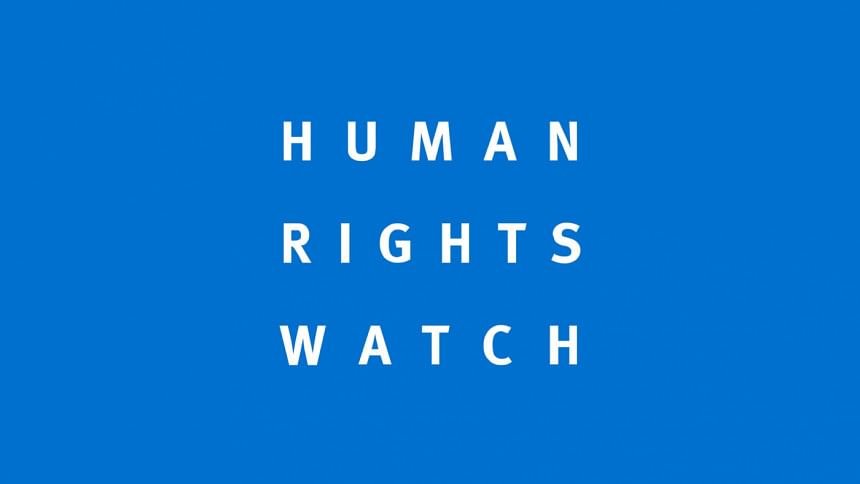Rohingyas accuse APBn of abuse

A 36-year-old Rohingya refugee activist was preparing a list of refugees allegedly abused by Bangladesh's Armed Police Battalion (APBn). In consequence, he faced arrest, arbitrary detention and torture, he claimed.
"I was picked up on December 3, 2021, from Thaingkhali Camp-13 on my way to offer Juma prayers in a mosque. I was kept in a room from that day till December 12, 2021, when I was shifted to Ukhiya Police Station," he claimed.
He alleged that he was indiscriminately tortured, and a burning candle was held to his genitals.
In a report by Human Rights Watch released yesterday, he was quoted as claiming, "I was put in a single room that looked like an APBn torture cell with equipment like sticks, rods, and electric shock materials. They kicked me with their boots every time someone came to interrogate me."
Many charges were brought against the refugee, starting from attempted murder, abduction, kidnapping, extortion, assault, to theft and unlawful assembly.
While in detention, his diabetes spiralled out of control and his injuries were so bad that he had to be taken to the field hospital, documents show.
The Daily Star is withholding the names of the refugee and the APBn unit.
The HRW in the report alleged that the APBn was committing extortion, arbitrary arrests, and harassment of Rohingya refugees with impunity.
The rights watchdog based its statements on interviews with over 40 Rohingya refugees, including 10 alleged victims who said that they were detained on apparently fabricated grounds of trafficking yaba. The organisation reviewed police reports and documented more than 16 cases of serious abuse by APBn officers.
A 27-year-old man who allegedly ran a YouTube channel was arrested and charged with possession of yaba tablets, a first information report dated June 25 of last year shows.
The FIR states that the man was hiding 620 yaba pills under his pillow which was discovered by the APBn during a raid. However, a Rohingya man named in the FIR as a witness to the incident disagreed.
"He is not into drugs," the witness, Md Jamal, told The Daily Star. He also said that he was unaware of being named in the case as a witness.
The man allegedly framed could not be reached, because shortly after being released he chose to leave the camp by sea on a trawler, said the witness.
On December 19, 2021, a group of seven people were arrested for possessing a locally-made one-shooter gun. According to the FIR of the case, a team of APBn-8 was raiding an area close to camp-9 and 10 around 12:45am when they received a tip-off that a group of Rohingya refugees were going to assemble to "commit a crime".
The FIR states that when the APBn reached the spot, the Rohingyas began running away, prompting the cops to arrest them.
One of the accused remembers the incident differently. "I was called to the area by the Head Majhi. When we all got there, I was detained. Later, we were all charged with possessing a gun," the 34-year-old accused told this newspaper.
The gun was recovered in front of hundreds of people, claimed the FIR. However, the man named in the case as a witness, one Nur Kamal, told The Daily Star that he could not remember the incident.
On the other hand, while the FIR accuses them of possessing a firearm, a local media quoted members of the APBn unit as saying that they had arrested the group because they were kidnappers.
"In late October, the APBn launched Operation Root Out in response to a spike in targeted killings by armed groups. The police have arrested at least 900 Rohingyas since mid-2022. But refugees allege that corruption in the APBn has allowed criminal activities to proliferate, while Rohingyas not responsible for crimes have ended up targeted in police crackdowns," said the HRW report.
Almost every case Human Rights Watch investigated involved extortion either directly by APBn officers or communicated through majhis, the camp community leaders, the report added.
"Police generally demanded Tk 10,000-40,000 [$100-400] to avoid arrest, and Tk 50,000-100,000 [$500-1,000] for the release of a detained family member. Families often had to sell gold jewelry or borrow money for bribes or legal costs."
The HRW logged responses from as many as 122 refugees. They claimed that they had been extorted for sums ranging from Tk 2,000 to Tk 7 lakh. Other than money, they were extorted for relief items like soap, rice and tarpaulins.
The report quoted a case study of one 57-year-old betel leaf shop owner who upon being arrested was asked to pay Tk 1 lakh for release. "Because we have such little income from the shop, we couldn't pay any amount to the police," his daughter told the rights watchdog.
The shop owner, now behind bars, was charged with possession of 2,000 yaba tablets and remains in jail. The HRW interviewed a witness named in the FIR, who knew nothing of the case or why he was named, said the report.
A Rohingya refugee, who claimed to have spent 70 days in jail for failing to pay a bribe of Tk 1 lakh, told the HRW, "APBn officers keep coming to me and my family asking for bribes. They think we have some sort of a money machine. How could we pay so much money? There is no way to earn money. There is no work. We already lost all of our gold to secure my bail. We are helpless."
The HRW said that each camp should task and train non-APBn personnel to receive complaints from refugees against police officers.
It also held donors accountable stating that the 2022 Joint Response Plan for the Rohingya humanitarian crisis received less than half of the $881 million needed for the year and that donors should support projects to promote Rohingya refugees' safety and protection.
Deputy Inspector General Md Jamil Hasan, in charge of the three APBn units responsible for security in the camps, said that the HRW report was levelling a blanket accusation on the force.
"They are making these conclusions based on one or two unverified cases. They didn't even approach us for our comments on these incidents. There is no question of torturing or harassing the Rohingya refugees," he said.
He claimed that the infighting among the armed gangs in the camps was so intense that when they take actions against one group, it accuses the force of having bias towards another, and come up with claims of extortion.


 For all latest news, follow The Daily Star's Google News channel.
For all latest news, follow The Daily Star's Google News channel. 








Comments